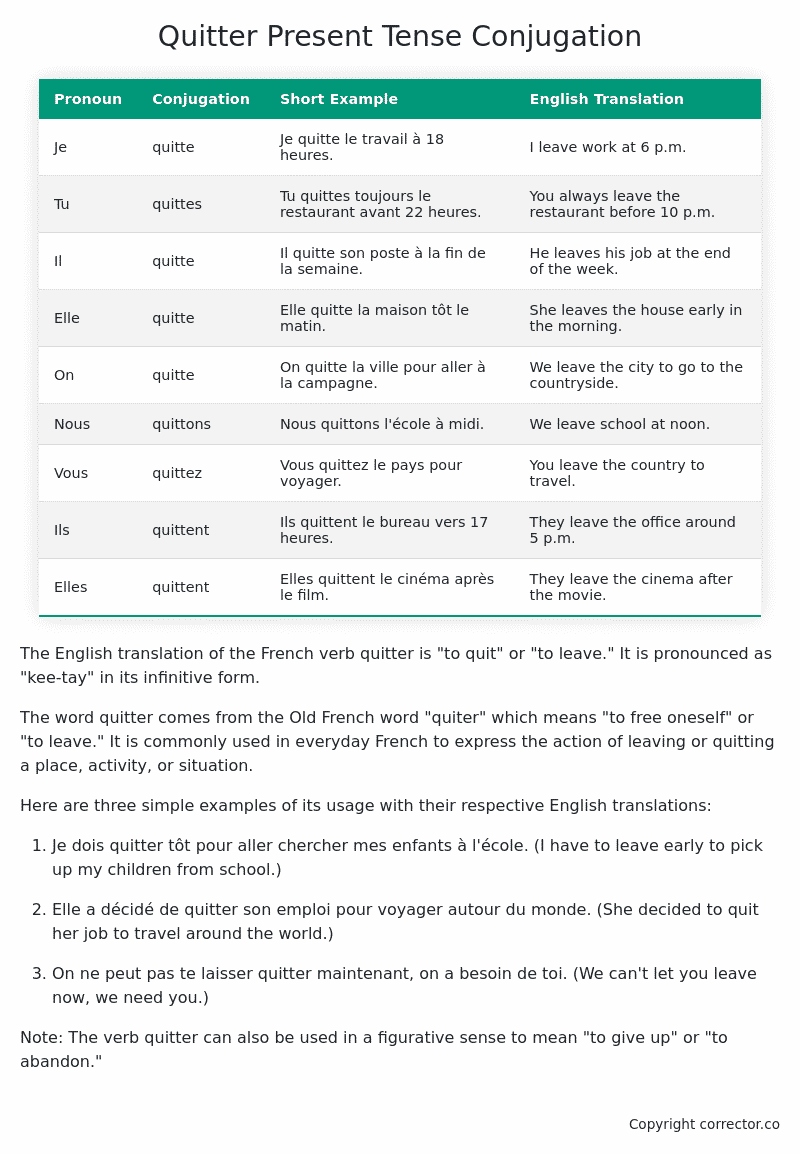Le Present (Present Tense) Conjugation of the French Verb quitter
Introduction to the verb quitter
The English translation of the French verb quitter is “to quit” or “to leave.” It is pronounced as “kee-tay” in its infinitive form.
The word quitter comes from the Old French word “quiter” which means “to free oneself” or “to leave.” It is commonly used in everyday French to express the action of leaving or quitting a place, activity, or situation.
Here are three simple examples of its usage with their respective English translations:
-
Je dois quitter tôt pour aller chercher mes enfants à l’école. (I have to leave early to pick up my children from school.)
-
Elle a décidé de quitter son emploi pour voyager autour du monde. (She decided to quit her job to travel around the world.)
-
On ne peut pas te laisser quitter maintenant, on a besoin de toi. (We can’t let you leave now, we need you.)
Note: The verb quitter can also be used in a figurative sense to mean “to give up” or “to abandon.”
Quitter – About the French Present Tense
To take a deep dive into all the French tenses then see our article on Mastering French Tense Conjugation.
Common Everyday Usage Patterns For Le Present
Interactions with Other Tenses
Table of the Present Tense Conjugation of quitter
| Pronoun | Conjugation | Short Example | English Translation |
|---|---|---|---|
| Je | quitte | Je quitte le travail à 18 heures. | I leave work at 6 p.m. |
| Tu | quittes | Tu quittes toujours le restaurant avant 22 heures. | You always leave the restaurant before 10 p.m. |
| Il | quitte | Il quitte son poste à la fin de la semaine. | He leaves his job at the end of the week. |
| Elle | quitte | Elle quitte la maison tôt le matin. | She leaves the house early in the morning. |
| On | quitte | On quitte la ville pour aller à la campagne. | We leave the city to go to the countryside. |
| Nous | quittons | Nous quittons l’école à midi. | We leave school at noon. |
| Vous | quittez | Vous quittez le pays pour voyager. | You leave the country to travel. |
| Ils | quittent | Ils quittent le bureau vers 17 heures. | They leave the office around 5 p.m. |
| Elles | quittent | Elles quittent le cinéma après le film. | They leave the cinema after the movie. |
Other Conjugations for Quitter.
Le Present (Present Tense) Conjugation of the French Verb quitter (this article)
Imparfait (Imperfect) Tense Conjugation of the French Verb quitter
Passé Simple (Simple Past) Tense Conjugation of the French Verb quitter
Passé Composé (Present Perfect) Tense Conjugation of the French Verb quitter
Futur Simple (Simple Future) Tense Conjugation of the French Verb quitter
Futur Proche (Near Future) Tense Conjugation of the French Verb quitter
Plus-que-parfait (Pluperfect) Tense Conjugation of the French Verb quitter
Passé Antérieur (Past Anterior) Tense Conjugation of the French Verb quitter
Futur Antérieur (Future Anterior) Tense Conjugation of the French Verb quitter
Subjonctif Présent (Subjunctive Present) Tense Conjugation of the French Verb quitter
Subjonctif Passé (Subjunctive Past) Tense Conjugation of the French Verb quitter
Subjonctif Imparfait (Subjunctive Imperfect) Tense Conjugation of the French Verb quitter
Subjonctif Plus-que-parfait (Subjunctive Pluperfect) Tense Conjugation of the French Verb quitter
Conditionnel Présent (Conditional Present) Tense Conjugation of the French Verb quitter
Conditionnel Passé (Conditional Past) Tense Conjugation of the French Verb quitter
L’impératif Présent (Imperative Present) Tense Conjugation of the French Verb quitter
L’infinitif Présent (Infinitive Present) Tense Conjugation of the French Verb quitter
Struggling with French verbs or the language in general? Why not use our free French Grammar Checker – no registration required!
Get a FREE Download Study Sheet of this Conjugation 🔥
Simply right click the image below, click “save image” and get your free reference for the quitter Present Tense tense conjugation!

I hope you enjoyed this article on the verb quitter. Still in a learning mood? Check out another TOTALLY random French verb present conjugation!


